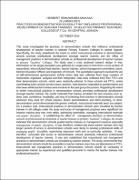| dc.description.abstract | This study investigated the practices in demonstration schools that influence professional development of teacher trainees in selected Primary Teachers Colleges in central Uganda. Specifically, the study established the extent to which instructional practices in demonstration schools promote professional development amongst teacher trainees and the effect of management practices in demonstration schools on professional development of teacher trainees T’ C. The study used a cross sectional research design in that, information on the target population was gathered at a single point in time from a cross-section of respondents, who included head teachers, teacher trainees, school management committees, tutors, District Education Officers and Inspectors of Schools. The quantitative approach involved the use of self-administered questionnaires (SAQ) where data was collected from large numbers of respondents organised, analysed and then interpreted. Data were collected from four PTCs and their demonstration schools, which were randomly selected. In these schools and PTCs, centre coordinating tutors and pre-service tutors, teachers, head teachers responded to questionnaires and interviews while teacher trainees were involved in focused group discussions. Regarding the extent to which instructional practices in demonstration schools promoted professional development amongst teacher trainees, the results indicated that trainees emulated the best practices such as, dress code, confidence, hospitality, and way of scheming from teachers in demonstration schools whenever they went for school practice, lesson demonstrations and micro-teaching. In short, demonstration school demonstrated the generic methods, instructional materials teach any subject. On a positive note, instructional practices in demonstration schools were emulated by teacher trainees in all colleges under the study and traces of management practices were significant for instance making duty rota, time tables, addressing assemblies, managing instructional materials ’ In establishing the effect of management practices on demonstration T’ C indicated that demonstration schools guided teacher trainees on management practices especially ’ It was therefore, evident that those teacher trainees who had longer periods of access to demonstration schools were likely to develop professional skills of ’ pline, supervising classroom work and co-curricular activities. It was, therefore, concluded that access to demonstration schools positively influences professional development of teacher trainees. It was also established that instructional and management practices in demonstration schools are emulated by teacher trainees. The study recommends that, demonstration schools should be accessible to teacher trainees since they are laboratories to PTCs. Instructional and management practices in demonstration schools should be conducted in appropriate manner by experienced and qualified personnel to mentor the teacher trainees into professional teachers. | en_US |

